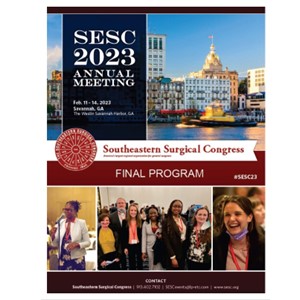Back
HPB
Category: Parallel Plenary Session 8
Quickshot Oral : Parallel Plenary Session 8
61 - COMPARATIVE ANALYSIS OF NSQIP NATIONAL AND INSTITUTIONAL OUTCOMES FOR ROBOTIC GASTRECTOMY: THE FUTURE OF GASTRIC RESECTION
Tuesday, February 14, 2023
9:03am – 9:10am East Coast USA Time
- VB
Vincent Butano, MD (he/him/his)
Fellow
AdventHealth Tampa, United States - SR
Sharona Ross, MD
United States
Presenter(s)
Principal Contact(s)
Objectives: The novel robotic approach has a vast application with a multiplicity of benefits as opposed to the traditional ‘open’ approach. The efficacy of robotic gastrectomy has yet to be clearly defined. The aim of this study is to compare patient outcomes following robotic gastrectomy at our institution to the national and patient-specific predicted outcomes provided by the American College of Surgeons (ACS) National Surgical Quality Improvement Program (NSQIP).
Methods: We prospectively studied 73 patients who underwent robotic gastrectomy. ACS NSQIP predicted and national outcomes were compared against our actual outcomes utilizing Student’s t-test and chi-square analysis, where applicable. Data are presented as median(mean±SD).
Results: Patients were 65(66±10.7) years-old with a BMI of 26(28±6.5) kg/m2. 35 patients had gastric adenocarcinoma and 22 had a gastrointestinal stromal tumor (GIST). Operative duration was 245(250±114.7) minutes, estimated blood loss was 50(83±91.6) mL, and there were no conversions to ‘open’. 1% of patients experienced surgical site infections compared to the predicted NSQIP rate at 10% (p=0.04). Actual patient length of stay was 5(6±4.2) days vs. the predicted value generated by NSQIP at 8(8±3.2) days (p=0.001). Three patients died during their postoperative hospital course. The total cost was $21,041(24,237±22,061). 1-year, 3-year, and 5-year estimated survival for patients with gastric adenocarcinoma was 76%, 63%, and 63%, respectively. 5-year survival for patients with GIST was 81%.
Conclusion: Robotic gastrectomy undertaken at our facility yields salutary patient outcomes and optimal survival for varying gastric diseases and disorders. Our patients experienced significantly shorter hospital stays and reduced complications in comparison to NSQIP national data. This leads us to believe that gastrectomy undertaken robotically is the future of gastric resection.
Methods: We prospectively studied 73 patients who underwent robotic gastrectomy. ACS NSQIP predicted and national outcomes were compared against our actual outcomes utilizing Student’s t-test and chi-square analysis, where applicable. Data are presented as median(mean±SD).
Results: Patients were 65(66±10.7) years-old with a BMI of 26(28±6.5) kg/m2. 35 patients had gastric adenocarcinoma and 22 had a gastrointestinal stromal tumor (GIST). Operative duration was 245(250±114.7) minutes, estimated blood loss was 50(83±91.6) mL, and there were no conversions to ‘open’. 1% of patients experienced surgical site infections compared to the predicted NSQIP rate at 10% (p=0.04). Actual patient length of stay was 5(6±4.2) days vs. the predicted value generated by NSQIP at 8(8±3.2) days (p=0.001). Three patients died during their postoperative hospital course. The total cost was $21,041(24,237±22,061). 1-year, 3-year, and 5-year estimated survival for patients with gastric adenocarcinoma was 76%, 63%, and 63%, respectively. 5-year survival for patients with GIST was 81%.
Conclusion: Robotic gastrectomy undertaken at our facility yields salutary patient outcomes and optimal survival for varying gastric diseases and disorders. Our patients experienced significantly shorter hospital stays and reduced complications in comparison to NSQIP national data. This leads us to believe that gastrectomy undertaken robotically is the future of gastric resection.

